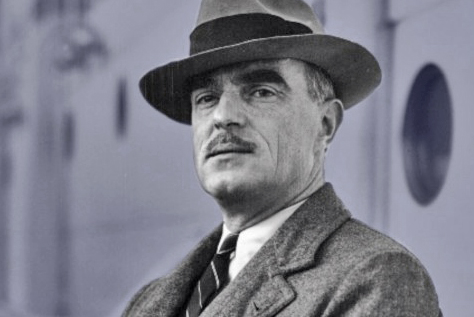
Playwright Thornton Wilder grew up in a family of precocious children. Amos Niven Wilder, his elder brother, became a professor of divinity at Harvard University, and played the tennis championships at Wimbledon. Wilder’s younger sisters—Charlotte, Isabel, and Janet—would all grow up to be accomplished in their respective vocations (writer, novelist, zoologist). The siblings were competitive with each other. In the following letter addressed to his father, Wilder describes a typical day of undergraduate life at Oberlin College before talking about the competitive family dynamic, and how it affected the siblings’ relationships. One might perceive a connection to his 1942 play, The Skin of Our Teeth.
The Square Tower
The First Day Of Spring The Third Year of the War
March 21, 1917
Dear Papa
and I am tired again tonight. A long day, full of a hundred distressing interruptions: today I have wished to contemplate peace and religious repose, as the sun with constancy contemplates the tender earth. Two dull classes: Miss Fitch on Evidences of Gnosticism in the Letters to Collossae; Harold King on Wages.
An organ lesson wherein I play my first hymn “Holy Holy Holy” and am introduced to rules governing the repetition of notes.
I write some rhymed jokes for the College annual.
I go to laboratory and fail to get results from some dismal experiments with Antimony and Bismuth. But the errant gases from sixty students’ experiments pass through my dried and coated lungs.
Then to rehearsal of the French Play. I remember myself as merry there, but there was no reason for it that I remember so we must have been fools together. Through all of this I was waiting for the dark. When people are tired in the day the thought of dusk is present in the back of their mind, not only because it brings sleep, but because it hides one face in the shadow. A tired person is a wounded person, and his eyes are his wounds; to them night brings a balsam.
Tonight I had to deliver bills for the College annual–to the Assistant Business Managership of which my class in compliment elected me. So I took a long, wandering walk, as I went dropping envelopes onto the mail-tables of the boarding-houses. I have enjoyed the walk. In the streets is the smell of leaves burning, whence I know not. It is one of the things Rupert Brooke mentioned as loving:
“These I have loved:
White plates and cup, clean-gleaming
…Wet roofs, beneath the lamplight; the strong crust
Of friendly bread; and many-tasting food;
Rainbows; and the blue bitter smoke of wood…
And as I went along I thought of your beautiful letter to me, as good as any letter I ever received. I do not think it a less spirit in me to say that perhaps I liked it partly because you spoke well of my letters, in turn. There are two insidious ghosts in our family and this exorcised one of them away; we in our way are not abundantly generous to one another—think us all over in turn—we are a grudging family. And not let me take another shoo at the other ghost–the fear of poverty, abject.
But we all seven of us are so splendid individually (we are more like a case of blue weapons than a flower-bed) that it would be presumptuous to ask for a sweeter ensemble. If we were a sober, New England, around-the-lamp, co-praying family I insist, we should be less. Amos would be more docile; I less modern, Charlotte less promising, Isabel less vivid, Janet more sophisticated, Mother less concentrated. You more demand–ative. We should be cut into pieces.
Love
Thornton
FURTHER READING
“In the midst of life we are in the midst of death”: how the edge of Wilder is now lost.
Wilder re-writing Waiting for Godot.
Magic for the cynical age.


